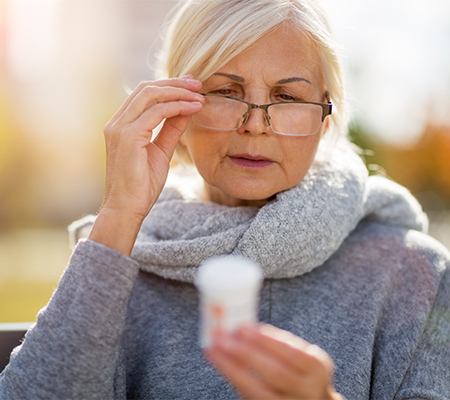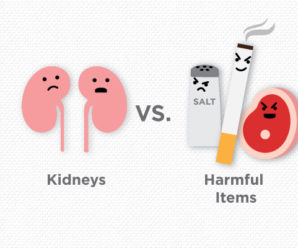
With the ongoing opioid crisis, many people are concerned about becoming addicted to opioids. For patients with cancer, it is natural to have the same reaction when a doctor prescribes an opioid for cancer-related pain.
According to Dr. Michael Larson, pain psychologist and the director of controlled medication policy for Marshfield Clinic Health System, the risk of patients with cancer developing an opioid use disorder (the new term for addiction) from the use of chronic opioids is 25% or 1 in 4 people. This is the same for all patients prescribed an opioid.
When the opioid epidemic began, patients with chronic pain were the primary recipients of opioid prescriptions. However, prescribing opioids for chronic pain has reduced significantly. According to Larson, Marshfield Clinic Health System has reduced total opioid prescribing by 69.5% since 2012.
Other ways to manage chronic pain, such as injections and surgery, have been added as additional treatment options in recent years for chronic pain. These options are not always available for cancer-related pain because of potential complications or ineffectiveness.
“There are certain types of cancer pain that are really difficult to control,” Larson said.
What causes cancer-related pain?
Cancer-related pain can be caused by:
- Cancer that makes structural changes in the body like cancer entering bones and weakening them.
- Cancer treatments causing symptoms like numbness and pain due to nerve damage.
“Typically, if the pain is caused by the direct effect of cancer on nerve cell endings called nociceptors, it is more likely to respond well to opioids,” said Dr. David Schifeling, palliative care doctor at Marshfield Clinic Health System. “Neuropathic causes of cancer-related pain are less likely to respond to opioids including treatment-related neuropathy or a pinched nerve caused by cancer.”
Treating cancer-related pain
Opioids are the primary treatment for cancer-related pain, but should be one part of the plan to manage pain.
Your oncologist also may prescribe a co-analgesic medicine. These medicines do not relieve pain themselves, but using these with an opioid has been shown to help with neuropathic pain. Acupuncture and massage also may provide some pain relief for cancer-related pain.
Larson explains oncologists will continue to prescribe opioids when needed because there is a larger health concern – cancer.
“With cancer, we have a bigger health condition we are dealing with,” Larson said. “Cancer patients should be focused on treating their cancer and shouldn’t be worried that they won’t get treated for their pain. If they have too much pain, they may not go through with their cancer treatments.”
When to ask for help with pain
Larson recommends you not use pain medicine if you can cope without it. Having trouble sleeping or resting are signs that the pain is too much and you may benefit from pain medicine to ensure you are able to fight the cancer.
“During treatment, we need people to be able to rest and not be overly stressed about the pain,” Larson said. “Pain is incredibly stressful on the body and it can reduce the chances of a good outcome and affect your treatments.”
Unfortunately, your doctor cannot predict if you will develop an opioid use disorder.
“A program should have good practices in place to wean patients off of opioids when there is no longer a need for the medicine,” Larson said.
This practice is called tapering. If you are concerned about using opioids, it is important to talk to your doctor about your pain management options.
Concerns and side effects of opioids
Once you are prescribed an opioid, your oncologist will pay special attention to how much you get. There is a narrow window between the opioid being effective and it causing other side effects. Taking too high of a dose at a time also can cause opioid use disorder.
After prolonged use of opioids, you also can become more sensitive to pain. Your doctor may call this hyperalgesia. This can make it harder to stop using opioids once the cancer is gone.
If your doctor prescribes opioids for cancer-related pain, the most common side effect is constipation. The provider that prescribes you opioids also should prescribe you a laxative.
Other side effects include sedation, dizziness, nausea, vomiting, physical dependence, tolerance and respiratory depression. However, Schifeling points out these side effects are either unlikely or you will develop a tolerance.
Opioids should be safely and securely stored at all times so children, visitors or family cannot access or remove the opioids. Diversion is when opioids are used for purposes that they were not prescribed for.
“I believe the diversion of opioids prescribed for patients with cancer-related pain is one of the most important issues related to treating cancer-related pain with opioids,” Schifeling said.
When the opioids are no longer needed, they should be dropped off at a designated drop-off location as soon as possible. Talk to your pharmacy for the closest location to get rid of your opioids.
Withholding opioids is an issue
The opioid epidemic also makes it harder for patients with cancer to get opioids. Doctors and loved ones can be skeptical that you actually need opioids for the pain.
Doctors may be reluctant to prescribe opioids, while loved ones may actually restrict the number of opioids you can take. Cancer patients themselves will even live with harsh pain too long instead of using opioids.
“Our program doesn’t restrict opioids for cancer patients,” Larson said. “The recommendations from the Center for Disease Control and Prevention and our own Health System guidelines decided it was better to manage a cancer patient’s pain. The guidelines are focused on those patients with chronic non-cancer pain.”
Even so, the medical community continues to discuss opioids and their use during cancer treatments. Oncologists have to weigh the risks of an opioid use disorder, or other risks associated with unintentional overdoses, with the risks of not using opioids for pain.
“Not controlling cancer-related pain can cause patients to refuse treatment, lead to poor survival and cause adverse outcomes,” Schifeling said.
While there are many risks using opioids for cancer-related pain, it is a necessary risk for many patients with cancer. If you have concerns, talk to your doctor. For Marshfield Clinic Health System patients, alcohol and drug recovery programs are available.







Leave a Reply